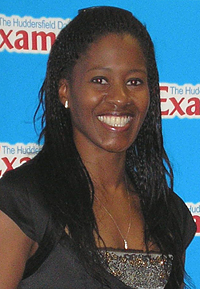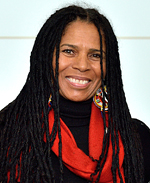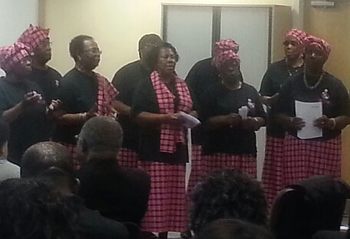Voices from the African Caribbean Diaspora
Wed, 06 Nov 2013 11:24:00 GMT
Britain’s African Caribbean communities explored and celebrated at pioneering conference

Pictured left at the Huddersfield Examiner Community Awards, Dr Michelle Bartholomew, principal organiser of the Voices from the African Caribbean Diaspora event.
FROM soul food to sound systems... the experiences, culture, history and identities of Britain’s African Caribbean communities were explored and celebrated at a pioneering conference held at the University of Huddersfield.
It drew an audience of 80 people, some from far afield, which meant that the first Voices from the African Caribbean Diaspora event was a big success, delighting its principal organiser, University of Huddersfield senior lecturer Dr Michelle Bartholomew, of the School of Human and Health Sciences.
“The feedback has been amazing and we hope it will be an annual event,” said Dr Bartholomew. “It was fairly local this year, but next year we hope it will be truly national.”
The genesis of the event was in the research that Dr Bartholomew conducted for her PhD, when she interviewed older African-Caribbean women about their health experiences.
“The women I interviewed all came from the West Yorkshire area and I wanted to be able to share my research with these women collectively, but also within a forum with other members of the community.”
 Keynote speakers – Professor Adele Jones and Rev Dr Michael Mkpadi
Keynote speakers – Professor Adele Jones and Rev Dr Michael Mkpadi
As plans for her conference took shape, supported by a team of organisers from the University and the local community, it was decided to hold it during Black History Month and the event featured two keynote speakers, the University of Huddersfield’s Professor Adele Jones (pictured right) and the Rev Dr Michael Mkpadi, who is Catholic Chaplain for the African and African Caribbean communities of the Leeds diocese.
Professor Jones’s talk was entitled Partnerships for Change and it drew on the work carried out in the Caribbean and Africa by the University’s Centre for Applied Childhood Studies. “Meaningful and genuine partnerships” were formed to tackle social problems and the lessons learned from the project were applicable to children in the UK too, argued Professor Jones.
Dr Bartholomew’s paper was entitled I don’t want Fish ‘n’ Chips, I want Soul Food. It drew on her research among African Caribbean women and stressed the importance of particular foods in maintaining a connection to homeland cultural beliefs. A significant finding of the research was that many of the women distrusted western medicine and believed that herbal remedies from their homeland gave some protection against illness.
Other speakers included:
- Dr Sharon Wray, who spoke about African Caribbean women’s experiences of grandmothering;
- The Rev Dr Sharon Prentis, on strategies to promote an integrated sense of identity and resilience in the Black community;
- Amanda Huxtable, who has taken part in the Sound System Culture Project, which gathered oral history from first and second generation African Caribbean settlers in Huddersfield;
- Milton Brown, who has researched gang culture in six high schools in the Kirklees area;
- Carol Gilchrist spoke about Kirklees Council’s approach to community involvement and engagement within the African Caribbean community;
- Jean-Marie Ninziza examined the asylum system and social environment that awaited refugees when they arrived in the UK;
- Debi Johnson spoke about the impact that can be made on individuals when they trace their often complex ancestry.
 Pictured left: Choir singing at the conference held at the University of Huddersfield
Pictured left: Choir singing at the conference held at the University of Huddersfield
The conference was attended by community groups, including Women in Action, a Huddersfield organisation whose choir sang at the event. Also, funds were raised to support the Ugandan organisation Wells of Hope, which provides care and schooling for the children of prisoners. The University of Huddersfield has formed strong links with the organisation.
“The thread that ran through all of the papers was around community, culture, and collective identity,” said Dr Bartholomew. “Many aspects were salient to one group of people, but I don’t think that the overall theme is entirely specific to the African Caribbean community in terms of why community, culture and collective identity are important.”
Now, it is hoped to publish an edited collection of papers presented at the first Voices from the African Caribbean Diaspora conference, added Dr Bartholomew.







